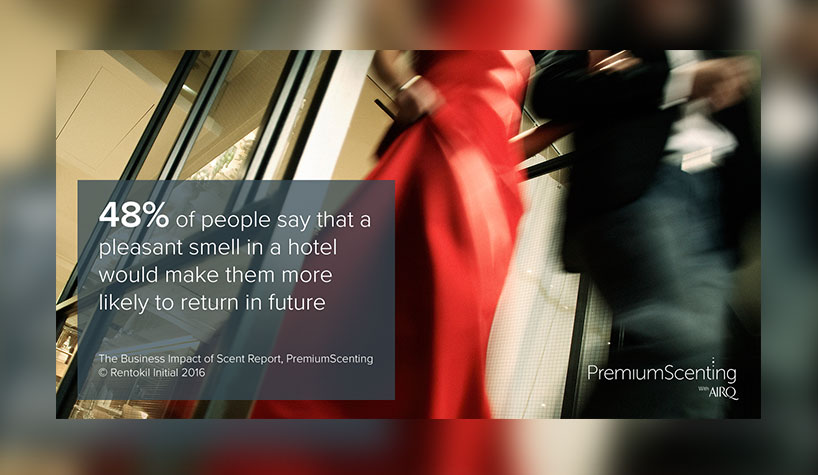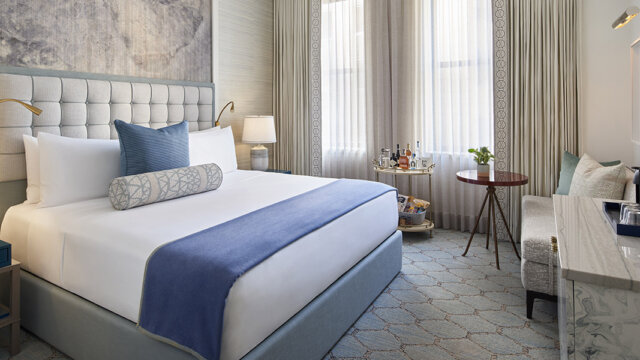READING, PA—Powerful to the senses, the right scent can capture a hotel’s locale or spark a pleasant memory during the stay. It can also impact a hotel’s bottom line.
“Smell is the most powerful of the senses,” said Janice Nath, an ambiance expert at Ambius, a global provider of scenting solutions for commercial spaces. “When introduced to a scent, guests tap into powerful memories and emotions. Hotels have a unique opportunity to achieve multisensory relationships with guests through the scents that are attributed to their brand. Guests strive to connect with brands; therefore, with the addition of scenting, brands are given a powerful opportunity to create long-lasting and more profitable relationships.”
According to findings in a report commissioned by Ambius titled “2019 Business Impact of Scenting,” customers are demanding a more pleasant scent as part of the overall brand experience. In the study, Ambius found that 91% of hotel guests said a pleasant smell had a positive impact, and 67% of people said a pleasant smell in a hotel would make them feel more relaxed and patient. By designing the right scent experience, Nath explained, hotels can create a deeper connection with guests, ultimately driving loyalty.
“A great opportunity occurs the moment the guest walks through the doors,” she said. “In our report, we discovered that this pleasant association can encourage repeat visits, strengthen the brand affiliation, drive loyalty, create an immersive guest experience and encourage more positive reviews. Scent is a part of design. When decor is selected, a feeling, an emotion is being created. Scent can deepen that emotion and enhance the decor in the room. For instance, if you add soft colors, like rose gold into a space with a soft floral scent, that will feel different from a room with blues and greens with a salty ocean scent.”
Hoteliers are employing scent in a variety of effective ways. Through research, Nath found that there are three key drivers for scenting in hotel design: elevating the ambiance for a more immersive guest experience; to enhance the branding strategy; and as a location-specific fragrance to evoke a particular atmosphere for a space drawing guests throughout the hotel.
“Branding and guest experience are key factors in driving repeat clientele for hoteliers,” she said. “It is crucial guest experience is engaged from the moment the guest arrives on property.”
A hotel brand-specific scent can serve the guest in different ways. Andaz uses scent to connect guests to the locale, while hotels using a diffuser in guestrooms can help travelers to reduce the feeling of pain, sleep, stress and nausea.
“The power of scent memory brings a lot of potential in influencing the mood and memories a guest will associate with your hotel. Through the awareness of scent memory, hotels can strategically create brand-associated memories and associations for their guests,” she said. “By using a bespoke scent throughout the hotel, guests come to associate the smell with that specific brand and their stay. This means that whenever they encounter the hotel and scent again, it will revive happy memories of their prior stay. This is what is referred to as the ‘welcome home’ effect.”
Nath explained that a signature scent can establish a strong brand association and unity across various locations in a chain. “When a guest visits a hotel in another city or country, the recognizable scent will remind them of previous visits—thus, providing a sense of comfort as well as linking the two places in the guest’s memory,” she said. “In our study, it was reported that 48% of people say that a pleasant smell in a hotel would make them more likely to return in the future.”
Scent is personal, but some guests can also be allergic to heavily fragranced areas. At Ambius, the team’s consultative approach enables them to find the right bespoke scent solution specific to the business and location.
“Fragrance components are regulated by many different legislations globally. Our Premium Scenting range complies with our internal safety standards, general product safety, REACH, CLP/ GHS, Workplace Health and Safety and International Fragrance Association (IFRA) standards to ensure the safety of our products,” she said. “Concentrated fragrance in liquid form can be an irritant to eyes and skin. When used in products, there should be no exposure to the concentrated fragrance itself, therefore reducing the likelihood of any hazards. In our Premium Scenting units, concentrated exposure does not occur, reducing the risk further. Premium Scenting fragrances do not contain any known respiratory sensitizers as required by the IFRA Code of Practice, as they are prohibited.”
When discussing the scent experience with hoteliers, Nath asks two questions: “How do you want your guests to feel?” and “What do you want them to remember?”
“This will typically tie into their property, their mission and everything from how the lobby feels and smells at check-in to how the shampoo smells in their rooms,” she said. “As we partner with designers on new hotel projects, especially boutique hotels, it is wonderful to see them embrace scent just as critical as a color to be included in their palette. In line with hotels looking to deliver the ultimate experience, you will see hoteliers connecting scent as an essential part of their guest and brand experience.”




